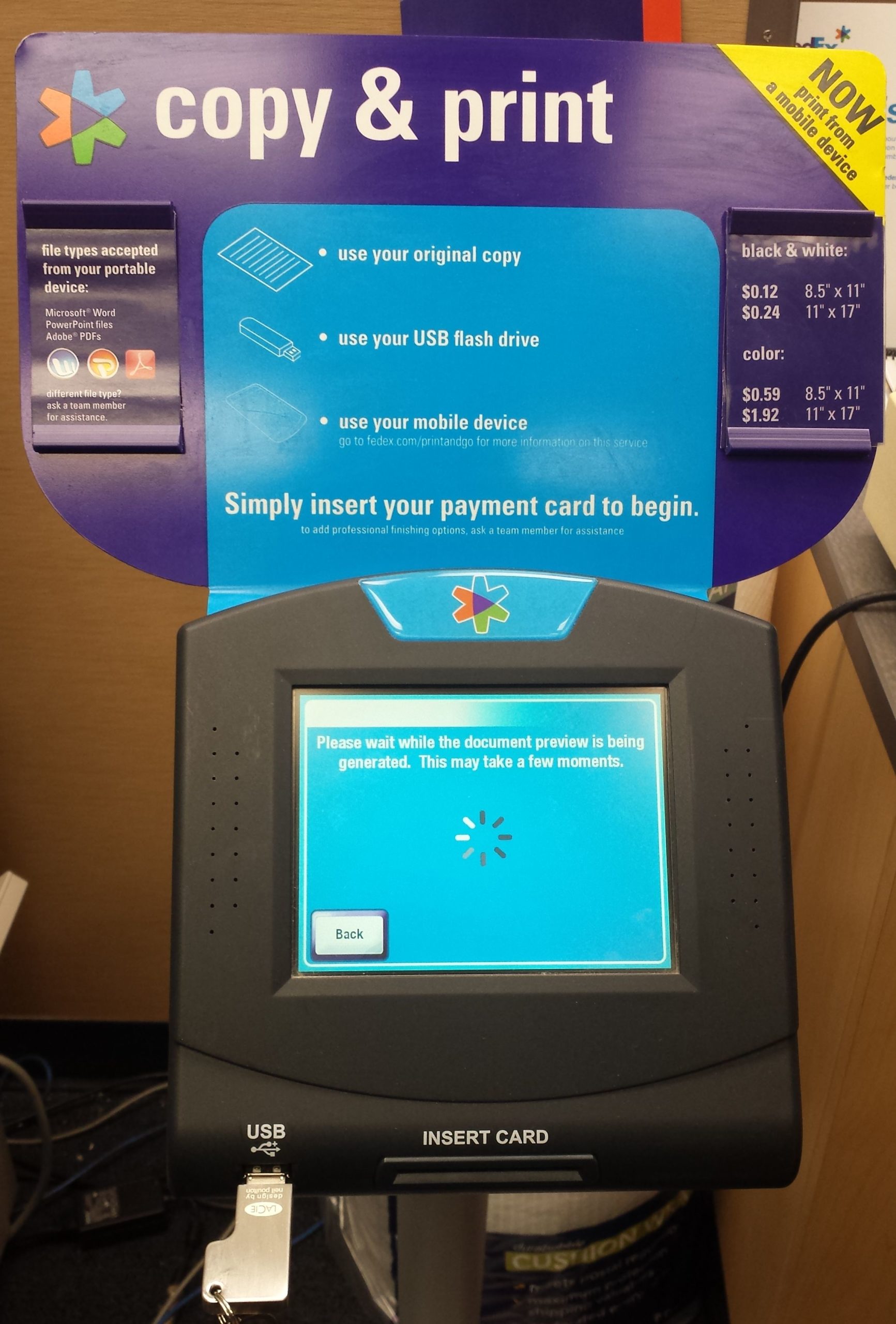
I’ve taken the picture above because it explains why I love markets. Sorry if the quality is so-so: I am an even worse photographer than a writer.
What you see there is a nice machine I have found in a FedEx shop in the DC area. I am on travel, and I needed to print out my ticket for an Amtrak train from DC to Philadelphia, where I was about to go to visit a friend.
The FedEX machine allowed me to plug in my USB flash drive, where I have previously saved a PDF version of my ticket, and print it directly. The whole process got my credit card charged by the amount of 0.12 dollars, for a black and white print (you don’t need train tickets to be fancy). I could have alternatively printed out directly from my DropBox, or from my cell phone.
I am old enough that the first time I visited Washington I ended up in sort of a crisis, because at the age of 18 I didn’t have a credit card but only an ATM machine card. The first Blackberry had just been produced, but as an 18 year old certainly I couldn’t afford one. I checked e-mails in Internet cafes (do you remember them?). Now iPads are used as notebooks in kindergarten.
Isn’t technology great? Certainly it is. But that very handy FedEX machine wasn’t just about technology. It was a genuine product of a free market system. Of course, it wouldn’t have been conceivable fourteen years ago: yes, printing machines were already around for quite a bit, but smart-phones and cloud storage weren’t. What that machine does is combining several technologies, each aimed at a specific end, to meet some particular demands not necessarily envisaged by their developers. To build it you needed the human ingenuity of forecasting a potential consumer’s need (the foreigner who needs to print his travel ticket), and so arrange technical capabilities as to respond to it.
Advocates of state interventions have recently claimed that government is far more responsible for advancements in technology than free marketers are ready to acknowledge. That is a complex debate: too often particular experiences are generalised in pretentious and yet unfounded generalities, and that subsidies and government involvement in research has opportunity costs is something people end up forgetting very easily.
It is not so much the technical capability to do something that matters: but the fact that someone discerns a use of such capability to meet a human need – perhaps one people themselves were not yet consciously aware of. This is the unique contribution of markets: not the technology itself, but the desire to turn it in the benefit of consumers. Markets are about human beings, not fancy toys – though fancy toys are great too.

READER COMMENTS
mobile
Dec 23 2013 at 11:48am
You had Internet cafes when you were 18? You kids these days don’t know how good you have it. When I was 18, if I wanted to go to an Internet cafe, I had to wait several years for the Internet to be successfully developed and commercialized to the point where the bandwidth and incentives were in place to support Internet cafes. Years! And if I wanted to check the Internet in my car, I had to … Hey! You stop rolling your eyes at me!
Harold Cockerill
Dec 23 2013 at 7:31pm
The genius of the market is not in coming up with great ideas but in the quickness with which it kills bad ideas. If you as a businessman in a free market keep pushing a bad idea you soon go out of business and make room for better ideas. The power of government can keep a bad idea alive for a long time. Bad ideas need to be killed quickly.
Tim
Dec 24 2013 at 1:50am
You could have printed this ticket for free from a ticket kiosk at the station.
All you would have needed is the credit card the ticket was purchased with. I am going to go ahead and assume that, as an adult, you had this.
Venkat
Dec 25 2013 at 11:10pm
Why print when you can show the SMS confirmation of your booking with ticket number, passenger details etc., along with your ID in its place? This is what Indian Railways lets us do.
Comments are closed.